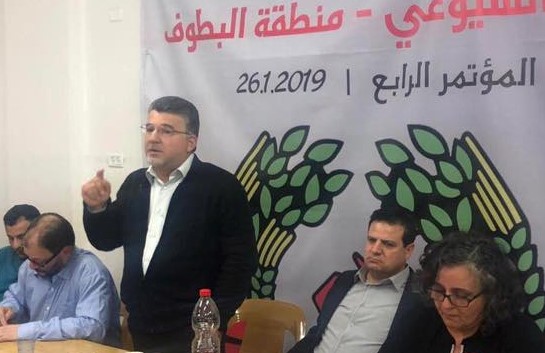“Our work in the Knesset is not limited to parliamentarian work; sometimes even the more important work by us is being done outside the parliament, whether it’s in the field by strengthening our community … or by representing the cause and values of our community in the international arena,” said Hadash MK Youssef Jabareen during an interview with Middle East Monitor.
“We believe that this political wing in the Knesset could also affect the political map in Israel. We have a political interest in blocking the expansion of right wing parties in Israel, led by [Prime Minister Benjamin] Netanyahu,” Jabareen continued, arguing that it’s conceivable a right-wing majority could be avoided in parliament.
“It’s a possibility now that there is some unity in the center of the political map in Israel,” he says, alluding to the merger between Benny Gantz and Yair Lapid to form the Blue and White party, currently slightly ahead of Netanyahu’s Likud in the polls. “I’m not saying that the alternative government would be a real alternative that would adopt our positions, but I believe that weakening the dangerous right-wing parties should be the target of everybody who has some hope to advance the peace process.” “It’s easier to negotiate with politicians from a central party, than the right,” Jabareen argues.
He slams Netanyahu as adding “fuel to the fire,” citing a recent speech in which the prime minister warned Jewish parties running against him, stating that they would be dependent on “Arab parties who work to abolish the state of Israel.” “This is clear incitement against Arab parties, Arab leaders and the Arab community in Israel, by denying the basic right of political participation. This is dangerous incitement in general, but definitely dangerous when it comes from the prime minister himself.”
As a member of Israel’s parliament, Jabareen witnessed first-hand last year the approval of the country’s controversial Nation-State Law, which he describes as a summary of “the extreme right-wing political agenda of the Netanyahu government.”
Jabareen also addresses the role of the US in Israeli politics; since the start of Donald Trump’s presidency, the relationship between the US and Israel has been hailed as by both sides as closer than ever. The US president has cut funding to the UN refugee agency UNRWA, and caused weeks of demonstrations around the world after recognizing Jerusalem as the capital of Israel. “We see clearly a kind of coalition that works on the ground behind the Israeli right-wing led by Netanyahu and the Trump administration,” Jabareen said. “I believe that Trump gave them the green light to go ahead with the Nation-State Law. In fact the proposal had been presented since 2011; it’s the change in the American administration that enabled the Netanyahu government to go ahead with this legislation last year.”
Jabareen reiterates that the bill enshrines apartheid into law: “It’s ironic that the same state that came to the conclusion decades ago that racial segregation is morally and legally wrong, is basically approving similar segregation systems here in Israel, as if they didn’t learn anything from history.”
Whilst the upcoming elections provide an opportunity for Arab parties to raise the profile of the Palestinian cause, Jabareen says that more needs to be done by foreign governments to counter America’s biased influence. “Unless there is an international intervention that will force Israel to adhere to the international consensus of a two-state solution, I am afraid that the situation will deteriorate into a total and ongoing conflict,” he concludes. “It’s a wakeup call for the international community before it’s too late.”



